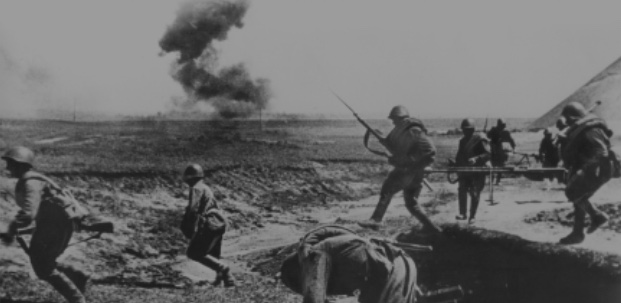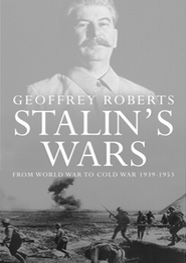Why Is a French Library Refusing to Carry a History of Stalin’s Russia?

Related Link Stalin’s Wars: An Interview with
Professor Geoffrey Roberts By Aaron Leonard
In December 2014, Godefroy Clair, a researcher, teacher and user of the Sorbonne University’s Pierre Mendés Library, proposed that the library should acquire the French edition of Stalin’s Wars: From World War to Cold War, 1939-1953 by Geoffrey Roberts.
 A
professor of History and International Relations at University
College Cork,
Roberts, is a distinguished Sovietologist, one of the leading
historians on the Soviet Union and World War II and a Fellow of the
Royal
Historical Society.
The work in question was originally published by Yale University
Press in 2006 and was chosen as an outstanding title by the 2007
University Press Books Committee. It has been translated into
Chinese, Czech, German, Polish and Russian and a French edition was
published as Les
Guerres de Staline
by Editions
Delga
in 2014.
A
professor of History and International Relations at University
College Cork,
Roberts, is a distinguished Sovietologist, one of the leading
historians on the Soviet Union and World War II and a Fellow of the
Royal
Historical Society.
The work in question was originally published by Yale University
Press in 2006 and was chosen as an outstanding title by the 2007
University Press Books Committee. It has been translated into
Chinese, Czech, German, Polish and Russian and a French edition was
published as Les
Guerres de Staline
by Editions
Delga
in 2014.
Roberts’ monograph argues strongly that Stalin was an effective war leader who played a decisive role in the defeat of Hitler and the wide acclaim that the work has received confirms that this work of scholarship is based on all available evidence and careful weighing of different arguments. It is for those same reasons that Clair proposed that the French edition of Roberts monograph on Stalin would be a valuable addition to the bachelor’s degree library of the prestigious university but was surprised to receive the following response:
‘The proposed work, although it was written by a university professor, does not in principle seem to us to display the historical and scientific neutrality required for it to be included on our shelves. Nor do the other books published by the same publishing house.’
When requests to clarify the response was met with what Clair describes as ‘a series of evasive answers’ he took it upon himself to visit the library shelves devoted to the history of Soviet Russia and the USSR to ascertain which publications had been deemed suitable historical material. Clare asserts that what he found was a canon of work which amounted to little more than what he considers to be ‘unprofessional journalism’.
In fact Clair makes the serious charge that over the past fifteen-years directors at the Pierre Mendés Library have engaged in systematic ‘McCarthyist censorship’ in a bid to stock publications imbued with ‘anti-Soviet propaganda’. Clare observed that controversial publications by Bernard-Henri Levy and André Gluckmann, as well as ‘outright holocaust-denying books such as those by Ernst Nolte’ were chosen to populate library shelves ahead of ‘important scholarly works published in French during the same period’ such as those by Arno Mayer, Michael Carley and Alexander Werth whose Russia at War 1941-1945 ‘remains absent’.
Clair asserts that this academic censorship is taking place in a particular context and points to a number of recent dubious claims made by some high profile European parliamentarians including the recent claim by Polish Foreign Minister, Grzegorz Schetyna, who on the 70th anniversary of the liberation of Auschwitz, asserted that ‘it was the Ukrainians and not the Soviet army who liberated the concentration camp’, and an equally decontextualized statement made by the Ukrainian Prime Minister, Arseniy Yatsenyuk, who claimed ‘that the Soviet Union had invaded Germany in June 1941’.
Clair is adamant that these ‘gross falsehoods’ have not received any official reaction because of a passivity which is made possible by ‘the lack of historical knowledge within public opinion partly because of the censorship which has extended into the university’. He stated:
‘While this censorship lay tacit and insidious for a long time, it has now attained such a level that the Sorbonne University library no longer attempts to dissimulate it, in its prohibition of a well-known university professor and the entire catalogue of a progressive publisher’.
Commenting on the controversial decision by the directors of the Pierre Mendés Library to ban Stalin’s Wars a bemused Professor Roberts stated:
‘Stalin’s Wars has been extensively reviewed but not even its worst critics have questioned its scholarly integrity. My most recent book -- Stalin’s General: The Life of Georgy Zhukov --won the Society of Military History’s Distinguished Book Award. My articles have been published in some of the world’s top International Relations journals. All my books may be found in university libraries across the world. There can be no reason for an academic library to prohibit the purchase of Les Guerres de Staline, except political prejudice’.
Clair agrees that the decision to ban Stalin’s Wars by the prestigious French university is politically motivated and he has launched an international petition against the banning of Geoffrey Roberts book. He has gained the support of the influential French historian, Annie Lacroix-Riz, professor emeritus of contemporary history at Université Paris 7 and Aymeric Monville, editor-in-chief of Editions Delga who published Les Guerres de Staline in 2014. The trio have launched an online petition against what they claim amounts to ‘McCarthyist censorship’ in French university libraries and have collected over 1700 signatures to date in support of their claim including those of prestigious international and French figures such as Noam Chomsky, Norman Finkelstein, Domenico Losurdo and Jacques Sapir.
The petition, addressed to the President of the Sorbonne University (Université Paris 1), Professor Phillippe Boutry, reads:
‘We demand that this blatant violation of university ethics be brought to an end, and that the Pierre Mendes France Library at the Sorbonne University respect diversity and pluralism in its acquisitions of scholarly publications. We demand also that this respect extend to all other university libraries. No to McCarthyist censorship in university libraries!’